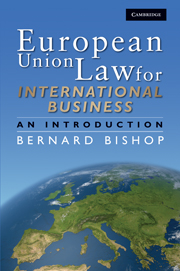Book contents
- Frontmatter
- Contents
- List of figures and tables
- List of case studies
- Preface
- Acknowledgements
- List of abbreviations
- Chapter 1 EU institutions and law making
- Chapter 2 Contracts for the sale of goods to an EU buyer
- Chapter 3 Transport of goods to an EU buyer
- Chapter 4 Customs law and procedure within the EU
- Chapter 5 Payment and risk management in international sales
- Chapter 6 Sales to the EU using an EU representative
- Chapter 7 Entering the EU market via franchising arrangements
- Chapter 8 Establishing a permanent presence in the EU
- Chapter 9 Resolving a dispute with an EU firm
- Index
- References
Chapter 1 - EU institutions and law making
Published online by Cambridge University Press: 05 June 2012
- Frontmatter
- Contents
- List of figures and tables
- List of case studies
- Preface
- Acknowledgements
- List of abbreviations
- Chapter 1 EU institutions and law making
- Chapter 2 Contracts for the sale of goods to an EU buyer
- Chapter 3 Transport of goods to an EU buyer
- Chapter 4 Customs law and procedure within the EU
- Chapter 5 Payment and risk management in international sales
- Chapter 6 Sales to the EU using an EU representative
- Chapter 7 Entering the EU market via franchising arrangements
- Chapter 8 Establishing a permanent presence in the EU
- Chapter 9 Resolving a dispute with an EU firm
- Index
- References
Summary
INTRODUCTION
The eu has its origins in the European Coal and Steel community formed by France, Germany, Italy, Belgium, Luxembourg and the Netherlands by the Treaty of Paris in 1951. This treaty transferred the power over the coal and steel industries of those states signing it to a central authority. The objectives of the treaty are important because they signalled what were to become central aims of the EU. The primary objective was to have the coal and steel industry controlled centrally rather than at the individual nation state level for industry efficiency. Underlying this, however, was the view that such central control would contribute to peace within Europe by preventing any of the major powers from rearming and thereby avoiding the devastation that occurred in the previous decade in World War Two.
The formal beginnings of the EU occurred in 1957 when the same six nations to the Treaty of Paris signed the Treaty of Rome and created the European Economic Community, now the European Community (EC). This treaty laid the foundations for the major institutions of the EU that exist today – the Council of Ministers, the European Parliament, the European Commission and the European Court of Justice. In addition, the EC Treaty moved beyond the aim of central regulation of a single industry to a much broader role of integration of the economies of the member countries.
- Type
- Chapter
- Information
- European Union Law for International BusinessAn Introduction, pp. 1 - 20Publisher: Cambridge University PressPrint publication year: 2009



